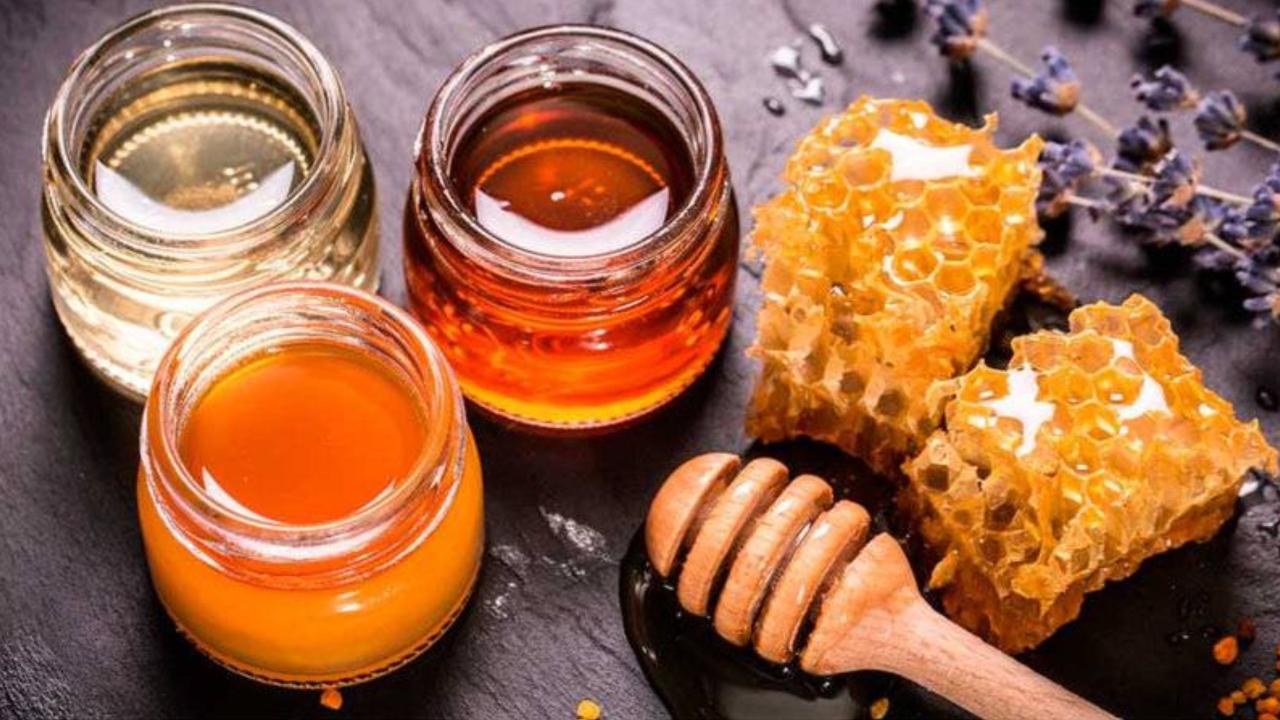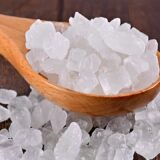Benefits Of Honey According To Ayurveda With Traditional Uses
Honey, known as Madhu in Sanskrit, has been revered in Ayurveda for thousands of years as one of nature’s most potent healing substances. It is not just a sweetener but a medicinal powerhouse, deeply embedded in Ayurvedic traditions for its therapeutic properties.
Ayurveda, the ancient Indian system of medicine, emphasizes the use of natural substances to balance the body, mind, and spirit. Honey, with its unique composition and properties, plays a vital role in this holistic approach to health.
This article explores the significance of honey in Ayurveda, its properties, types, therapeutic uses, precautions, and how modern science validates its ancient wisdom.
Honey in Ayurveda
Honey has been a staple in Ayurvedic medicine since ancient times. It is mentioned in classical Ayurvedic texts like the Charaka Samhita, Sushruta Samhita, and Ashtanga Hridaya, where it is described as a Yogavahi—a substance that enhances the medicinal properties of other ingredients it is combined with. Honey is also considered a Rasayana (rejuvenator) and is widely used to promote longevity, vitality, and overall well-being.
In Ayurveda, honey is not just a food but a medicine. Its unique properties make it suitable for balancing the doshas (Vata, Pitta, and Kapha), enhancing digestion, boosting immunity, and promoting healing. Whether consumed alone or as part of herbal formulations, honey is a versatile remedy for a wide range of health conditions.
Properties of Honey According to Ayurveda
Ayurveda classifies honey based on its Rasa (taste), Guna (qualities), Virya (potency), and Vipaka (post-digestive effect). These properties determine how honey interacts with the body and its therapeutic effects.
Rasa (Taste): Honey is primarily Madhura (sweet) in taste. However, it also has a slight Kashaya (astringent) taste, which contributes to its healing properties.
Guna (Qualities): Laghu (light): Easy to digest and does not burden the digestive system.
- Ruksha (dry): Helps absorb excess moisture in the body, making it beneficial for Kapha-related conditions.
Virya (Potency): Honey has a Sheeta (cooling) potency, which makes it effective in balancing Pitta dosha and reducing inflammation.
Vipaka (Post-Digestive Effect): After digestion, honey has a Madhura (sweet) effect, which nourishes the tissues and promotes strength.
Effect on Doshas:
- Balances Kapha: Honey’s dry and light qualities help reduce excess Kapha, making it useful for conditions like obesity, congestion, and sluggish digestion.
- Balances Pitta: Its cooling nature soothes Pitta-related issues such as inflammation, acidity, and skin disorders.
- Increases Vata: In excess, honey can aggravate Vata due to its dry and light qualities. Therefore, it should be used cautiously by individuals with Vata imbalances.
Types of Honey in Ayurveda
Ayurveda classifies honey based on the source of nectar, which determines its properties and therapeutic uses. Some of the common types of honey mentioned in Ayurvedic texts include:
1. Makshika Honey
- Source: Makshika honey is collected from bees that gather nectar from small, delicate flowers. These flowers often grow in remote areas, which is why Makshika honey is considered quite rare and valuable.
- Properties: This honey is light, dry, and has a slightly astringent taste. Its lightness makes it ideal for use in various treatments without overwhelming the system.
- Uses: Makshika honey is highly prized in Ayurveda for its ability to support the eyes and vision. It is considered effective for eye disorders such as dryness, redness, and strain. Its cooling and soothing nature also makes it ideal for alleviating respiratory issues like asthma and bronchitis. Additionally, it is believed to enhance cognitive functions, including memory and intelligence, by balancing the mental faculties. Regular use of Makshika honey can promote mental clarity and sharpness. It is also used to balance the Pitta dosha, making it a key ingredient in Ayurvedic remedies for people with fiery constitutions.
2. Bhramara Honey
- Source: Bhramara honey is gathered by bees that collect nectar from large flowers, which tend to be found in tropical and subtropical regions. The large blossoms from which this honey is sourced have a richer, fuller fragrance.
- Properties: This honey is heavy and moist, which makes it thicker and more nourishing compared to other types. Its richness helps it provide deep nourishment to the body and mind.
- Uses: Bhramara honey is known for its strength-enhancing properties. It is used to increase vitality, promote body strength, and improve overall stamina. This honey is particularly beneficial for individuals who experience fatigue, weakness, or low energy. It is also used to support reproductive health and to nourish the tissues of the body, making it a useful remedy for improving skin health and promoting healing. Additionally, Bhramara honey supports the respiratory system by relieving symptoms of chronic cough and respiratory conditions.
3. Kshoudra Honey
- Source: Kshoudra honey is collected from small bees, and it is often sourced from flowers that are found in more temperate or cooler climates.
- Properties: This honey has a mild and soothing nature, making it gentle on the digestive system and perfect for those with sensitive constitutions.
- Uses: Kshoudra honey is highly effective in treating urinary disorders, such as urinary tract infections (UTIs) or bladder discomfort. Its mild and soothing properties help reduce irritation in the urinary tract and support healthy kidney function. It is also known to aid digestion, especially in individuals with weak digestion or bloating. This honey is often used to balance Vata dosha, which is associated with dryness and irregularity in the digestive system. It has a calming effect on the nervous system, helping to relieve stress and anxiety, thus promoting overall well-being.
4. Pauthika Honey
- Source: Pauthika honey is gathered from large bees that collect nectar from a variety of large and vibrant flowers. These bees tend to have a robust nature and gather nectar from flowers with richer, more complex flavors.
- Properties: This honey is warm and stimulating, known for its ability to invigorate the body and mind. It has a higher natural sugar content, making it energizing and revitalizing.
- Uses: Pauthika honey is particularly useful for improving circulation and stimulating metabolic processes. It helps to enhance blood flow, which can be beneficial for people who feel sluggish or have poor circulation. This honey is often used to treat cold-related conditions, such as cold hands and feet, as it promotes warmth and internal balance. It is also effective in improving respiratory health, especially when used in combination with other warming herbs like ginger or turmeric. Additionally, Pauthika honey can be used to balance Kapha dosha, as it counteracts its cold and sluggish qualities.
5. Chhatra Honey
- Source: Chhatra honey is collected by bees that gather nectar from umbrella-shaped flowers, such as those of certain species of the Clove family. These flowers are often large and provide abundant nectar, making them ideal for honey production.
- Properties: Chhatra honey is sweet, nourishing, and highly regarded for its ability to promote overall vitality and strength. Its sweetness is gentle, and it is often considered the most balanced of all honey types.
- Uses: Chhatra honey is used in Ayurvedic formulations to promote strength, enhance immunity, and improve overall health. It is considered an excellent tonic for those recovering from illness, as it supports the body’s natural healing processes. This honey helps to build and nourish the tissues (Dhatus) and is particularly beneficial for those with weak immunity or those who experience frequent colds or infections. It also has a cooling effect on the body, making it ideal for balancing excess heat in the system, especially in the summer months. Chhatra honey is often prescribed for people suffering from digestive disorders, as it can help soothe inflammation in the stomach and intestines.
These various types of honey are used in Ayurveda for their unique properties and therapeutic effects. Each type of honey supports different aspects of health and is carefully selected based on an individual’s doshic balance and specific health needs.
Each type of honey has unique therapeutic benefits, and Ayurvedic practitioners often choose specific types based on the individual’s constitution (Prakriti) and health condition (Vikriti).
Top 10 Therapeutic Uses of Honey in Ayurveda
Honey is a versatile remedy in Ayurveda, revered for its wide range of therapeutic applications. It is used both internally and externally to support health and well-being. Below are some of its key therapeutic applications:
1. Digestive Health
- Enhances Digestion: Honey is a natural digestive aid that stimulates the digestive fire (Agni), promoting healthy digestion. It balances the digestive system without increasing Pitta dosha, ensuring smooth breakdown and assimilation of food.
- Relieves Constipation: Honey acts as a mild natural laxative, facilitating bowel movements and helping to relieve constipation without causing dependency. It softens stools and makes bowel movements more regular.’
- Detoxification: In Ayurvedic detox therapies like Panchakarma, honey is used to eliminate toxins (Ama) from the body. Its cleansing properties help to detoxify the system and improve overall metabolic function.
2. Respiratory Health
- Alleviates Cough and Cold: Honey is a potent cough suppressant and is often used with herbs such as ginger, tulsi (holy basil), and black pepper to alleviate symptoms of cold and respiratory infections. It soothes the throat, reducing irritation and coughing.
- Asthma Relief: Honey’s anti-inflammatory properties help reduce swelling and irritation in the airways, providing relief from asthma symptoms and improving airflow. It is used as a natural remedy to support lung health.
3. Wound Healing
- Antimicrobial Properties: Honey’s natural antiseptic and antimicrobial properties help prevent infections in wounds, cuts, and burns. It creates a protective barrier and promotes the natural healing process by fighting off bacteria.
- Tissue Regeneration: Honey nourishes damaged tissues and accelerates the healing process. It aids in the regeneration of skin cells and helps wounds heal without leaving scars, making it a powerful remedy for cuts and skin abrasions.
4. Skin Care
- Treats Burns and Wounds: Honey’s cooling, soothing, and healing properties make it ideal for treating burns and skin injuries. It reduces pain, inflammation, and swelling, speeding up the healing process.
- Anti-Aging: As an Ayurvedic skincare ingredient, honey is used in face masks and lotions to hydrate the skin, reduce the appearance of fine lines, and improve skin elasticity, providing a youthful glow. It also helps to even out skin tone by removing dead skin cells.
5. Weight Management
- Aids in Weight Loss: Honey’s light and dry qualities help balance the Kapha dosha, which is associated with weight gain. Consuming honey with warm water and lemon in the morning can help boost metabolism, curb appetite, and promote fat burning.
- Boosts Metabolism: By stimulating digestion and promoting healthy metabolic processes, honey supports overall weight management and reduces the accumulation of fat in the body.
6. Immune Boosting
- Enhances Immunity: Honey is known for its ability to strengthen the immune system. It has natural antibacterial, antiviral, and antifungal properties that help protect the body from infections. It boosts the body’s defenses and aids in fighting seasonal illnesses.
- Supports Recovery: Honey is a natural source of energy and nourishment, helping the body recover faster from illness or physical exhaustion. It supports the body’s resilience by promoting vitality and maintaining a healthy immune response.
7. Rejuvenation
- Promotes Longevity: In Ayurveda, honey is considered a Rasayana, a substance that enhances vitality and promotes longevity. Regular consumption of honey nourishes the tissues, improves circulation, and rejuvenates the body, leading to better health and increased lifespan.
- Restores Vital Energy: Honey is used as an effective tonic to replenish energy levels, especially in those suffering from fatigue or weakness. Its nutrient-rich content helps restore balance to the body and mind, revitalizing the spirit.
8. Mental Clarity and Stress Relief
- Supports Mental Health: Honey is believed to calm the mind, reduce stress, and enhance mental clarity. It helps balance Vata and Pitta doshas, contributing to improved focus, mental clarity, and emotional stability.
- Reduces Anxiety: The soothing properties of honey can help alleviate anxiety and promote relaxation. Consuming honey before bedtime helps in reducing nervous tension and supports restful sleep.
9. Cardiovascular Health
- Heart Health: Honey has been shown to support cardiovascular health by reducing cholesterol levels and improving circulation. It helps in regulating blood pressure and preventing heart-related ailments due to its antioxidant-rich content.
- Strengthens Blood Vessels: Honey helps in maintaining healthy blood vessels and improving blood circulation, which can support overall heart health and reduce the risk of cardiovascular diseases.
10. Liver Health and Detoxification
- Supports Liver Function: Honey is considered beneficial for liver health in Ayurveda. It helps detoxify the liver by promoting the removal of toxins and improving liver function, which is crucial for overall health and well-being.
- Cleanses the Body: When taken with warm water, honey stimulates liver detoxification, encouraging the liver to flush out waste and harmful substances from the body, resulting in a healthier digestive system.
These ten therapeutic applications highlight the multifaceted benefits of honey in Ayurveda, making it a cherished and versatile remedy for numerous health concerns.
Ayurvedic Preparations and Remedies with Honey
In Ayurveda, honey is not only valued for its natural healing properties but it is also used as a base in a variety of formulations and remedies for different ailments. Here are some common Ayurvedic preparations and remedies that incorporate honey:
1. Honey and Ginger (Zingiber Officinale)
- Preparation: A combination of fresh ginger juice and honey is often used to treat digestive issues, cold, and cough.
- Therapeutic Benefits: Ginger helps improve digestion and acts as a natural anti-inflammatory, while honey soothes the throat, relieves coughing, and boosts immunity.
- Use: This remedy is especially beneficial in treating respiratory infections, nausea, and sore throat. A teaspoon of this mixture, taken with warm water, can work wonders for digestive and respiratory health.
2. Honey and Tulsi (Ocimum sanctum)
- Preparation: Honey mixed with fresh tulsi (holy basil) leaves or tulsi juice is a common Ayurvedic remedy for respiratory ailments.
- Therapeutic Benefits: Tulsi is known for its antimicrobial, anti-inflammatory, and immune-boosting properties, while honey works as a soothing agent. This combination helps relieve symptoms of colds, coughs, and asthma.
- Use: Take a tablespoon of this mixture daily for immunity building and to manage respiratory issues.
3. Honey and Lemon
- Preparation: A mixture of honey and lemon juice in warm water is often consumed early in the morning for weight management and detoxification.
- Therapeutic Benefits: Honey aids in digestion, while lemon helps cleanse the liver and boost metabolism. This combination supports the detox process and helps flush out toxins from the body.
- Use: Drink this mixture on an empty stomach in the morning to enhance metabolism and support weight management.
4. Honey and Turmeric (Curcuma longa)
- Preparation: A blend of turmeric powder and honey is commonly used to treat inflammatory conditions and skin ailments.
- Therapeutic Benefits: Turmeric has powerful anti-inflammatory and antioxidant properties, while honey supports wound healing and soothes skin.
- Use: Apply this mixture as a face mask for acne or skin irritation, or consume it internally to reduce inflammation and support the immune system.
5. Honey and Aloe Vera (Aloe barbadensis)
- Preparation: A paste of honey and aloe vera gel is used for skin care and healing purposes.
- Therapeutic Benefits: Aloe vera is known for its cooling and healing properties, while honey offers antimicrobial action. This combination works effectively for treating burns, wounds, and skin irritations.
- Use: Apply this mixture to burns or cuts for quick healing and to reduce inflammation.
6. Honey and Cinnamon (Cinnamomum verum)
- Preparation: A mixture of honey and cinnamon powder is widely used for its medicinal properties in Ayurveda.
- Therapeutic Benefits: Cinnamon is a powerful anti-inflammatory and antimicrobial herb that, when combined with honey, boosts immunity and supports digestive health.
- Use: This combination can be taken internally for better digestion, weight loss, and improved heart health.
7. Honey and Ashwagandha (Withania somnifera)
- Preparation: A paste of honey and ashwagandha powder is often used to enhance energy and reduce stress.
- Therapeutic Benefits: Ashwagandha is an adaptogen that helps the body adapt to stress, while honey nourishes and supports overall vitality.
- Use: Consume this remedy daily for energy and stress relief, particularly for those dealing with fatigue or anxiety.
8. Honey and Cow’s Ghee (Clarified Butter)
- Preparation: The mixture of equal parts honey and ghee is an age-old Ayurvedic remedy, often consumed to nourish the body and mind.
- Therapeutic Benefits: Ghee is known for its nourishing qualities, while honey balances the body’s energy and supports digestive health. Together, they promote longevity, strength, and mental clarity.
- Use: Take this combination in small amounts, typically a teaspoon, in the morning for rejuvenation and to support overall well-being.
9. Honey and Cardamom (Elettaria cardamomum)
- Preparation: Honey mixed with cardamom powder is used in Ayurveda for digestive and respiratory health.
- Therapeutic Benefits: Cardamom aids in digestion and helps relieve bloating, while honey provides soothing and healing effects. Together, they balance the digestive system and support lung health.
- Use: Take a small amount of this mixture after meals to relieve indigestion and improve digestion.
10. Honey and Saffron (Crocus sativus)
- Preparation: Saffron-infused honey is an Ayurvedic preparation used for its rejuvenating and skin-enhancing properties.
- Therapeutic Benefits: Saffron is known for its mood-lifting properties and its ability to enhance skin radiance. When combined with honey, it promotes healthy, glowing skin and supports mental wellness.
- Use: Apply the honey-saffron mixture as a face mask for a glowing complexion or consume it to support mental clarity and emotional well-being.
Additional Ayurvedic Remedies with Honey
- Honey for Sleep: A warm glass of milk with honey before bedtime helps to calm the nervous system and promote restful sleep.
- Honey and Black Pepper (Piper nigrum): This combination is used in Ayurvedic medicine to alleviate congestion, improve circulation, and support respiratory health.
- Honey and Amla (Indian Gooseberry): A mixture of honey and amla juice is used to boost immunity, promote skin health, and provide essential Vitamin C.
Honey, when combined with various herbs and natural substances, becomes a powerful agent in Ayurvedic healing. These preparations offer a holistic approach to health, treating everything from digestive issues to skin conditions, all while enhancing vitality and immunity.
Precautions and Contraindications
While honey is a potent remedy, it must be used mindfully to avoid adverse effects. Some key precautions include:
- Heating Honey: Ayurveda strongly advises against heating honey, as it can become toxic and produce Ama (toxins) in the body. Honey should never be cooked or added to hot liquids.
- Dosha Imbalance: Excessive use of honey can aggravate Vata due to its dry and light qualities. Individuals with Vata imbalances should use honey in moderation.
Health Conditions:
- Diabetes: Honey is high in natural sugars and should be used cautiously by individuals with diabetes.
- Allergies: Some people may be allergic to pollen or bee products and should avoid honey.
Modern Scientific Perspective
Modern science has validated many of the traditional uses of honey. Research has shown that honey possesses:
- Antimicrobial Properties: Effective against bacteria, viruses, and fungi.
- Anti-Inflammatory Effects: Reduces inflammation and promotes healing.
- Antioxidant Activity: Protects the body from oxidative stress and free radical damage.
- Wound Healing: Accelerates tissue repair and reduces scarring.
These findings align with Ayurvedic claims, highlighting the timeless wisdom of Ayurveda.
Honey is a true gift of nature, offering a perfect blend of sweetness and healing. In Ayurveda, it is more than just a food—it is a medicine, a rejuvenator, and a versatile remedy for countless health conditions. By understanding its properties, types, and therapeutic uses, we can harness the power of honey to enhance our health and well-being.


























Interesting article, I find honey as a boost to energy really great. I have been selling Lavender honey for years from the Lavender fields of Provence France. It is sensational!